Applying Classic Child Development Theories to Gangs and Urban Violence
I recently had an exchange with @millycf1976 about violence in Jamaica. She explained how her childhood home, Jamaica, has been stolen from her, from family, and from neighbors by pervasive violence. This was a disquieting conversation so I began to investigate socioeconomic conditions of the country.
2008 Jackson Mississippi
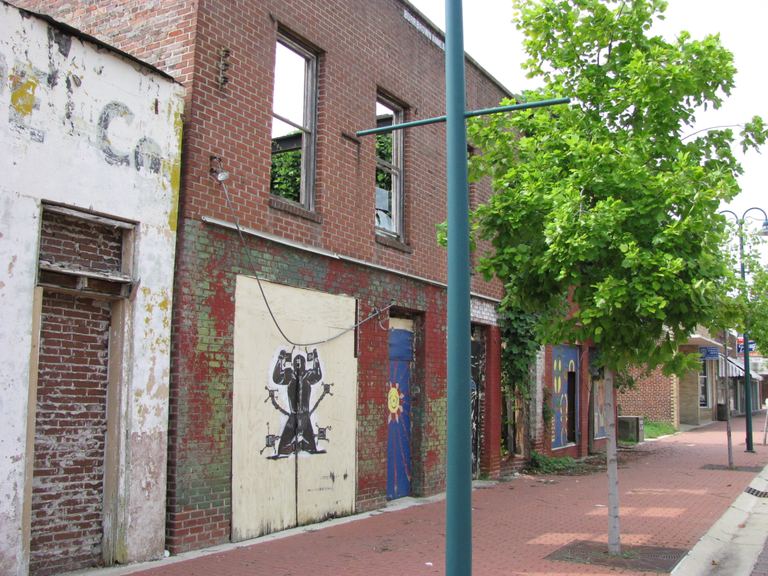
Credit: NatalieMaynor from Jackson, Mississippi, USA. Used under CC 2.0 license. Jackson has suffered its calamities and these calamities have left the city with daunting challenges. In 1979 the Pearl River swelled and flooded the city to levels not see before in recent memory. In 2022, less severe flooding damaged a water treatment plant and left the people of the city without clean, safe water. The municipality has to date been incapable of remedying the problem and consistently delivering clean water to its residents.
Rampant violence is not unique to Jamaica. In the U.S., for example, Jackson Mississippi has the highest reported murder rate in the country. As a matter of fact, in January of 2022 the reported murder rate in Jackson was 100 per 100,000. For the entire island of Jamaica, the reported murder rate in November 2022 was 49.4 per 100,000. In both Jamaica and Jackson authorities report that gangs drive the violence.

Gangs Have Existed Since Ancient Times
It does not seem to be a time or place that leads to the development of gangs, but rather an economic and social dynamic. In some cases, the gangs have been associated with political parties or figures. This is the case, it has been suggested, with powerful gangs in Jamaica. It was the case in mid-19th-century New York. In the picture below two gangs with political affiliations battle it out in the streets of New York.
Dead Rabbits Battle the Bowery Boys in Five Points
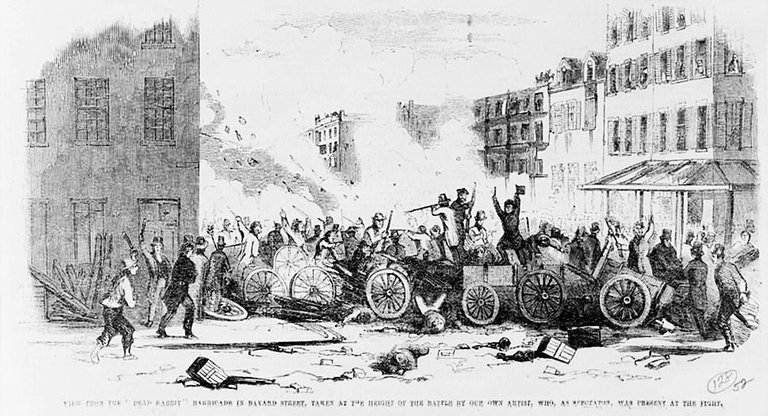
Credit: Illus. in: Frank Leslie's illustrated newspaper, v. 4, (1857 July 18), p. 108. Public domain

As I read about Jamaica and its struggle with crime, I looked at pictures and videos of some cities on the island country that have high crime levels. Always gangs were featured in these images. Pictures of children were captured in the frames. These children are the future gang recruits. Without them, it is likely gangs would wither on the vine.
Traditionally, authorities address gang violence by going into neighborhoods and arresting members. Soldiers and police do drug busts and gun confiscations. But these enforcement actions don't seem to make an enduring dent in gang activities. The effect of these enforcement actions is a little like lobbing off the tail of a young alligator. In time, the juvenile alligator's tail will grow back. The gang will replenish its strength with new recruits. Those recruits, for the most part, will be children who live in the neighborhoods where gangs operate.
My grim realization, that children are the lifeblood and future of gangs, motivated me to look at classic child development theories to try and understand how we can deprive gangs of their future. Why are children attracted to gangs? Why are they not drawn to legitimate social institutions? How do gangs succeed where these institutions fail? If we, if our leaders understood the mechanism behind child recruitment, maybe we could cut off the head of this monster instead of its tail.
I considered respected theories of childhood development with an eye to relating these theories to gang recruitment. No theory has all the answers. No theory is universally accepted. But many of the psychologists/social scientists who write about child development do have valuable ideas that might help to inform actions that would impede recruitment of children into gangs.

Maslow: Child Development and the Hierarchy of Needs
In 1943 Abraham Maslow published a paper on child development in which he described a 'Hierarchy of Needs'. He presented this hierarchy in the form of a pyramid. He place the most basic, essential needs as a foundation, at the bottom. The pyramid consisted of five layers (pyramid below was created by me using Gimp and Paint, with a diagram from Perspectives in Psychological Science used as a model).
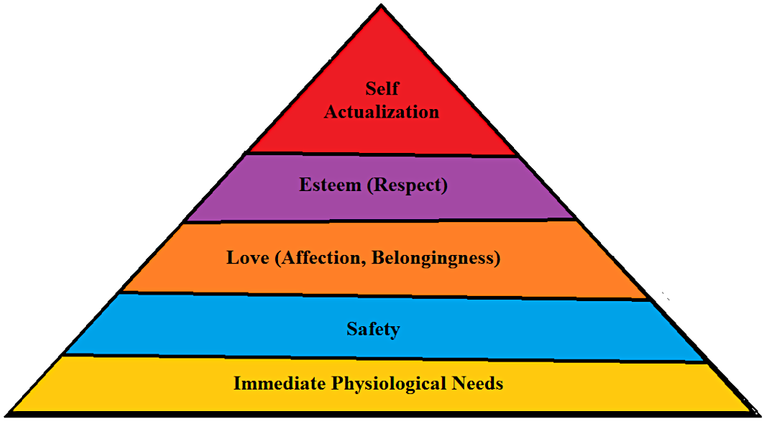
As needs are met, children move up the pyramid to satisfy the next set of needs. The first level of the pyramid is what a child needs to survive--food, shelter. Maslow's pyramid does not dictate that a need must be met 100% in order for a child to move on to the next level.
Do Gangs Fill Needs Not Met Elsewhere?
If a child is growing up in a home, or a community, where basic needs are neglected, where the child is not safe, then the child may look elsewhere for satisfaction of that need. If a child doesn't derive a sense of belonging, of esteem, or worth, from the home, the community or established social institutions, then the child may look elsewhere to satisfy these basic needs.
A 2010 bulletin issued by the U. S. Department of Justice on youth gang involvement stated that gang members explained their motivation for joining:
• For protection
• For fun
• For respect
• For money
• Because a friend was in the gang
Other reports I've read emphasize the social aspect of a gang (belonging), safety the gang offers, status gang membership provides and opportunities to earn money. In essence, the gang is meeting needs present in Maslow's pyramid.

Lev Vygotsky: Sociocultural Theory of Cognitive Development
Lev Vygotsky published his work on child development in the early 20th century. He proposed what has been called the Sociocultural Theory of child development. In recent years increasing attention has been paid to his work, which emphasizes the influence of mentors and others in a child's environment.
Mangkong Girl With Baby Brother, Laos Vygotsky asserted that "learning is a crucially social process as opposed to an independent journey of discovery". Those beliefs and attitudes can be transmitted to the child by a More Knowledgeable Other, an MKO. In Vygotsky's view, every child is unique and responds to the social influences in the immediate vicinity--the Zone of Proximal Development. Vygotsky suggested "that children internalise and learn from the beliefs and attitudes that they witness around them." The views of other highly respected child development theorists contrast with Vygotsky's ideas about the pliable nature of a growing child. Piaget and Erikson, for example, suggest a more rigid pattern of development--distinct stages. For each of these two theorists, a child is almost programmed to proceed from one stage of intellectual development to another. However, in their theories, environment does have a profound influence on how the child progresses through those stages. (Note please that I am skipping over Freud. While there remain in practice Freudian psychologists, his psychosexual theory of childhood development has lost its relevance for many). Behaviorists: John Watson and B.F.Skinner Diagram of Pavlov's Conditioning Experiment With Dogs Pavlov's classic experiment with dogs illustrates this theory. By repeatedly ringing a bell every time food was presented, Pavlov 'conditioned' the dogs to salivate at the sound of the bell. Take Your Pick
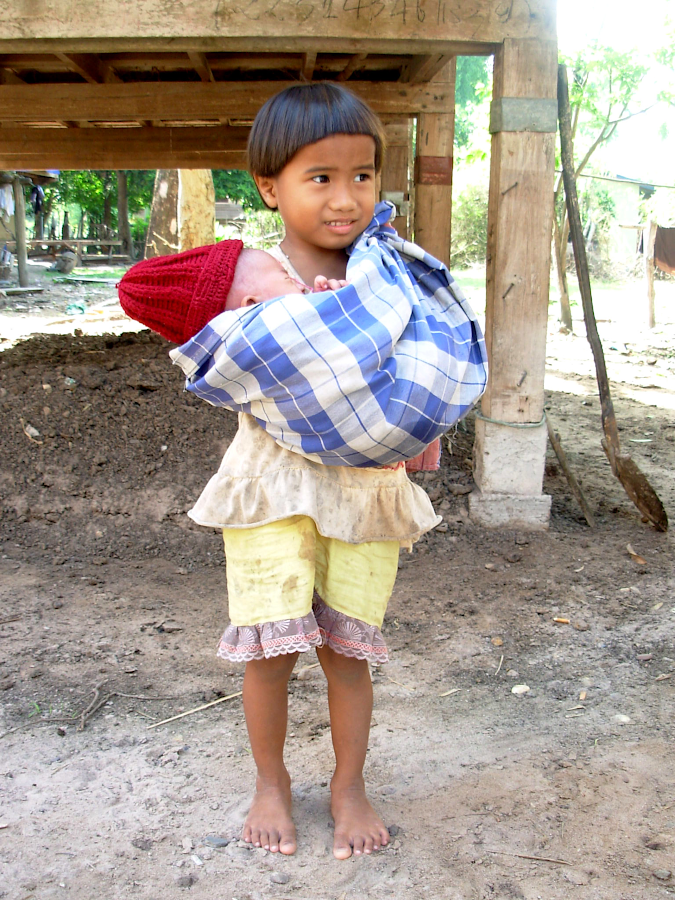
Credit: BigBrotherMouse. Used under CC 3.0 license. According to Vygotsky's Theory of Child Development, the cognitive growth of the baby in the picture will be influenced strongly by the care it receives from its sibling. In this case, the young girl is part of the baby's Zone of Proximal Development.*
According to the behaviorist school of child development, children are conditioned by their environment. As summarized by an article published on the Western Governor's University site, Watson, Skinner, and other behaviorists believed that a child's development could be determined entirely by its environment and not by its parents or its genetic heritage.
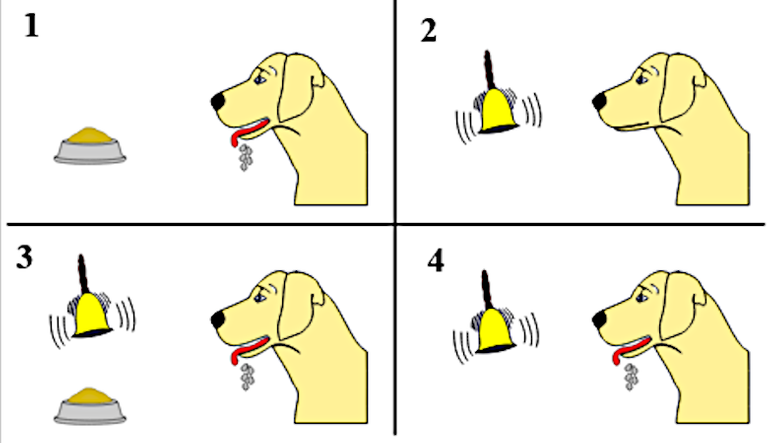
Maxxl². Used under CC Attribution-Share Alike 4.0 International, 3.0 Unported, 2.5 Generic, 2.0 Generic and 1.0 Generic license.
Which one of the psychologists I've mentioned has a persuasive theory, in your view? Vygotsky? Maslow? Skinner? Whichever combination of theories you choose, look at the video offered (by Free Documentary) below and try and imagine the influence this environment will have on the developing minds of children:
Curtailing the Development of Gangs
A serious effort to curtail the development of gangs would take an enormous concentration of resources. The effort would entail removing children from areas such as those depicted in the video above. As long as such communities exist, there will be children who are tempted to join a gang because that seems the most attractive alternative.
If we don't give our children the kind of environment (according to just about every child psychologist) that leads to positive growth, then we are dooming our communities, and ourselves to a future in which gangs hold whole neighborhoods, and even cities, hostage.


- @muelli,

A fractal made from an image he provided to the LMAC Image Library, LIL. - @yaziris,

An image he provided to the LMAC Image Library, LIL.
1.https://peakd.com/hive-126152/@millycf1976/reflecting-on-my-recent-visit-to-jamaica#@millycf1976/re-agmoore-rq9t6n
2.https://www.clarionledger.com/story/news/2022/01/27/jackson-mississippi-2021-homicides-highest-per-capita-murder-rate/9230045002/
3.https://travellersworldwide.com/is-jamaica-safe/
4.https://jamaica.loopnews.com/content/gang-feuds-still-fuelling-murders-jamaica-despite-over-400-arrests
5.https://www.wlbt.com/2021/02/11/so-jackson-has-gang-problem-what-does-that-mean/
6.https://www.cambridge.org/core/books/abs/cambridge-world-history-of-violence/gang-violence-in-the-late-roman-republic/96CED83F2809A92747F1851032F1E7A6
7.https://jamaica.loopnews.com/content/gangsters-now-co-operating-across-political-lines-says-chang
8.http://moglen.law.columbia.edu/twiki/bin/view/AmLegalHist/BenMarcu-FightingForIndependenceAtTheFivePoints
9.https://jamaica.loopnews.com/content/gang-feuds-still-fuelling-murders-jamaica-despite-over-400-arrests
10.https://www.reuters.com/world/americas/jamaica-renews-regional-states-emergency-due-gang-violence-2022-12-28/
11.https://www.smithsonianmag.com/smart-news/alligators-are-now-largest-species-known-regrow-severed-limbs-180976628/
12.https://www.aacap.org/AACAP/Families_and_Youth/Facts_for_Families/FFF-Guide/Children-and-Gangs-098.aspx
13.https://www.weather.gov/jan/1979_04_17_easter_flood
14.https://disasterphilanthropy.org/disasters/jackson-mississippi-water-crisis/
15.https://www.ncbi.nlm.nih.gov/pmc/articles/PMC3161123/
16.https://www.ojp.gov/pdffiles1/ojjdp/231116.pdf
17.https://tarrant.tx.networkofcare.org/kids/library/article.aspx?id=1814
18.https://ojjdp.ojp.gov/sites/g/files/xyckuh176/files/jjbulletin/9808/why.html
19.https://www.nationalgangcenter.gov/Content/Documents/Parents-Guide-to-gangs.pdf
20.https://www.nationalgangcenter.gov/Content/Documents/Parents-Guide-to-gangs.pdf
21.https://www.verywellmind.com/what-is-sociocultural-theory-2795088
22.https://www.gowriensw.com.au/thought-leadership/vygotsky-theory
23.https://www.futurelearn.com/info/courses/differentiating-for-learning-stem/0/steps/15505
24.https://www.wested.org/resources/zone-of-proximal-development/
25.https://www.gowriensw.com.au/thought-leadership/vygotsky-theory
26.https://positivepsychology.com/piaget-stages-theory/
27.https://positivepsychology.com/erikson-stages/
28.https://www.verywellmind.com/freuds-stages-of-psychosexual-development-2795962
29.https://www.wgu.edu/blog/what-behavioral-learning-theory2005.html#openSubscriberModal
30.https://www.simplypsychology.org/pavlov.html
31.https://www.youtube.com/@FreeDocumentary
This was an extremely interesting read, being someone who lives in a Caribbean country as well that suffers the similar if not the same issues! I remember doing a research project for a topic like this but for our country Trinidad and Tobago and it seems that we are not that dissimilar. Your conclusions of the children as well as their early on influences/ developments are spot on, thanks for sharing!
Thank you for that feedback. It was important for me to emphasize that the problem is not a Jamaican problem. It's a social problem. And it is one that does have a solution, no matter how difficult that might be. What is lacking is the will to devote resources. When children are growing up they are confronted with a menu of options. They will choose the most attractive. We have to insure that gangs, or other antisocial paths, are not the best choice.
I appreciate the feedback very much.
A very interesting post @agmoore.
It seems that gang violence is increasing worldwide, also in Portugal. They're mainly in the big cities, where there are neighborhoods that the police have already abandoned. This has always been the case, but especially in uncertain times like these, the tendency to solve problems with violence is increasing.
Fortunately, I was able to raise my son in a rural area. 😎
Hello @muelli,
That is interesting. I did not visualize Portugal with gangs, but of course they can spring up anywhere.
That is appalling.
I'm glad you brought up your son in a rural area. Unfortunately, in the wrong area, good parenting is not enough to insulate children.
Thanks so much for stopping by and for your interesting feedback.
https://twitter.com/416626589/status/1628086209783234562
https://twitter.com/27706436/status/1628092185546567681
The rewards earned on this comment will go directly to the people( @agmoore, @seckorama ) sharing the post on Twitter as long as they are registered with @poshtoken. Sign up at https://hiveposh.com.
Hello friend, I hope you are well with your family, it is a very interesting topic how gangs have proliferated in countries like Jamaica, where children who are vulnerable due to lack of resources such as food, clothing, seek to integrate these gangs and personalize themselves. in criminals, in my country there are also gangs that extort merchants and are complicit with the law, family values within the home are important to minimize all this
Hello friend @cetb2008,
I am well, and I hope the same is true for you and your beautiful family.
Family values are indeed important, but sometimes that is not enough. Children are at risk who grow up in urban environments where schools are not good and all around them there is criminal behavior. Your mountains walks with your children is the best defense. Keep them in the country. Keep them close🌷.
Thank you for reading and commenting. I am sorry about the gangs in your country. Here we have them also, but where I live the activity is not obvious, although I am sure it is around and I don't see it.
Be well and take care of your lovely family.
Hello Sir, @agmoore,
It is been quite a while, i trust you are doing well and that things are going great at your end. Your works are always a pleasurable read, the details and research is well done and i must say i enjoyed every bit of it.
I believe, just as you mentioned earlier, a single theory could not necessarily explain everything and so knowledge must be pulled from the various schools of thought if something is to be done about the situation.
I do believe that Maslow was right though and to me that theory holds a lot of power and influence in a child's growth and association. We all want to be where we feel loved, cared for, protected and not deprived. And so in a broken home children may could easily end up on the streets because neither parents really get time to give the needed attention.
These kids could find solace in another figure in the gang and once things get out of hand and they end up conditioned as described in Pavlov's theory, they develop loyalty for the streets and not much could be done about it then.
But these issues are concerning and i am hoping the future will be better as things getter better for the world. Thank you so much for sharing this lovely and eye-opening writeup. It was a pleasure, cheers and have a have a wonderful time.
Thank you for your wonderful comment, @nattybongo. I found both Maslow and Vygotsky persuasive. It makes common sense. Children truly are blank slates. They are there for us, for society, to offer direction. They don't come with a road map. We give that to them. Sometimes homes are not broken. Sometimes the influence of a poor school and chaotic community might be enough to pull a child away from home influences. This is especially true when a child enters puberty and peers become so important.
If you read the blog by @millycf1976 you will see why I was prompted to write this. Such a lovely family, and they are trapped by the crime in their community.
I hope you and your family are well. Thanks again for your meaningful feedback.
I see your point very well, the tabula rasa theory, it was one of the interesting things I learned in my 2nd year in the university when I didn’t introduction to clinical psychology.
Let me read the suggested article too
Thanks for your contribution to the STEMsocial community. Feel free to join us on discord to get to know the rest of us!
Please consider delegating to the @stemsocial account (85% of the curation rewards are returned).
Thanks for including @stemsocial as a beneficiary, which gives you stronger support.
Thank you, @stemsocial. I very much appreciate your support!
Hello there @agmoore
Your post is so informative and full of resources that I will definitely check it out in detail. I was about to board a plane yesterday when I saw your post. I'm in Cairo looking out at the pyramids after a long day and night of travelling😁
The comparisons and history are intriguing.
I have bookmarked this one:)))
You really struck a chord in me with your post, @millycf1976. It was so human, and personal. You can see that others in the world, all over the world, have a similar experience.
Thank you for prompting this research, and this blog. I hope you are having fun on your trip 😇
This is a very interesting and at the same time disturbing article. Violence is widespread worldwide, I believe that there is no country that has not been touched by it.
Violence is the reason why there are more migrants in the world, and it is a problem that seems to have no end, on the contrary, it is spreading its tentacles more and more.
I think that violence starts at home and social networks are only an instrument to give bad ideas to people with violent minds.
This post is worthy of a magazine article, you are a good researcher! 👍
Hello my friend, @mballesteros. You can see from the response to this post that the problem is indeed widespread. Sometimes, a home is not enough to protect children. We need a responsible society, a place where children can be educated and walk around with safety and with decent influences.
The first thing we as people need from society is safety. That is apparently lacking in so many places.
Thank you for reading and for the thoughtful feedback.
very interesting
!1UP
Thank you!
You have received a 1UP from @gwajnberg!
@ccc-curator, @stem-curator, @vyb-curator, @pob-curator
And they will bring !PIZZA 🍕.
Learn more about our delegation service to earn daily rewards. Join the Cartel on Discord.
I gifted $PIZZA slices here:
@curation-cartel(4/20) tipped @agmoore (x1)
Join us in Discord!
One of my most reflex-like thoughts whenever I talk to any anarchist is, "But wouldn't the gangs/mafia just take over everything?" Peaceful people don't naturally form groups and train with weapons to face potential enemies. But government creates jobs out of it (police, army) and outright forces people to serve (mandatory army service). So is it possible gangs are the force that drives and necessitates government? Sometimes the government is even itself a gang. Putin took care of the regular gangs by basically becoming the number one gangster. In political science and history "gangster regime" is the official academic term they use for Putin's regime!
Regarding gangs and the (socio)enonomic aspect, I remember one method Penn & Teller and James Randi and others used to make tricksters stop fooling people out of their money by pretending to talk to the dead and such, was to offer them actual jobs. These "psychics", mostly talented and smart people, often just had no other way of making money, so they turned to conning.
Yeah the government can be just another gang, one that holds all the marbles😄
Where are these peaceful people? It's my experience that in the absence of authority (to impose order), bullies take over. I have a lot of experience with bullies.
Thieving and conning can be hard work. I think you're right, many choose that path because they don't see a 'legitimate' way of earning the same amount of money. Of course, legitimacy is an odd word. It suggests sanctioned by authority, but a lot of what goes on legitimately is a con, isn't it?
As always, your comment is insightful and interesting.
Thanks for stopping by, @alexanderalexis. Hope your life is relatively peaceful.